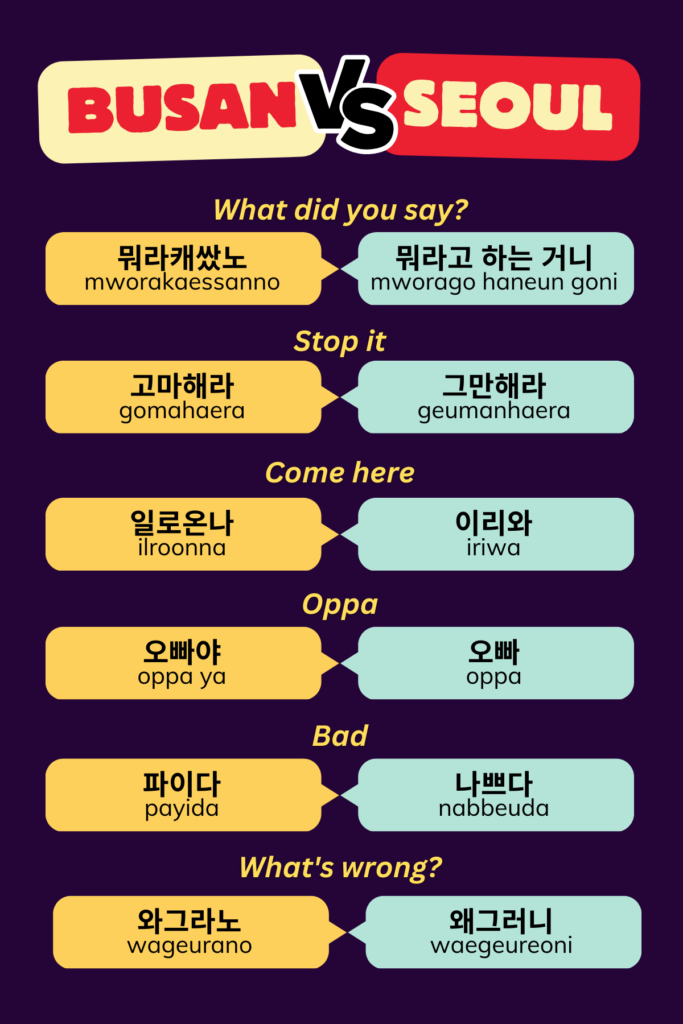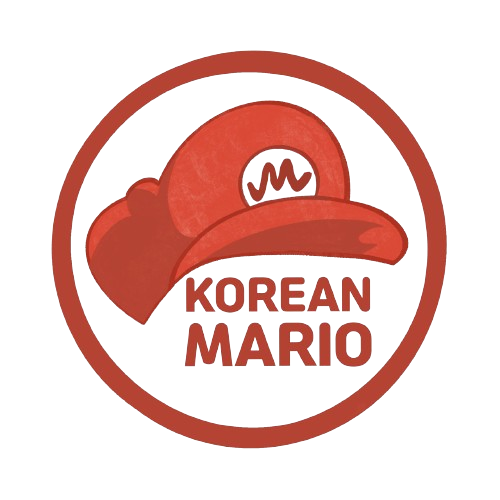
Exploring Busan Dialect: Unique Phrases, How It Differs from Seoul, and Key Characteristics
Characteristics of the Busan Dialect
Located near the East Sea, Gyeongsang Province’s dialect is best represented by the Busan dialect. Busan is a coastal city, and the people living in this environment often have characteristics bestowed by the sea: they are easygoing, carefree, and their speech is naturally straightforward and blunt.
Common endings: -예, -소, -데이, -나?, -노?, -는교?
Differences between Busan and Seoul Dialects
The tone of Busan dialect is noticeably different from that of Seoul dialect. Seoul speech is more standardized, while Busan speech is more casual.
Busan Dialect
🔊 야 임마 니 뭐하노?
What are you doing, kid?
🔊 퍼떡 안오고 뭐하노?
Why aren’t you coming quickly? What are you doing?
Seoul Dialect
🔊 저기요. 지금 뭐하세요?
Hello, what are you doing now?
🔊 빨리 안 오고 뭐 하세요?
Why aren’t you coming quickly? What are you doing?
Common Busan Dialect Phrases
Here are some interesting Busan dialect phrases collected for you:
🔊 뭐라캐쌌노
Seoul version: 🔊 뭐라고 하는 거니? (What did you say?)
You can probably guess the meaning, which is “What did you say?” However, this phrase is used more when you think what the other person said is inappropriate, rather than not hearing them clearly.
🔊 욕보이소!
Seoul version: 🔊 고생하세요 (Please work hard) / 🔊 수고하세요 (Thank you for your effort)
This phrase means “Please work hard” or “Thank you for your effort.”
🔊 고마해라. 마이 뭇다 아이가
Seoul version: 🔊 그만해. 많이 먹었잖아. (Stop it. You’ve eaten a lot already)
A frequently heard phrase, especially in dramas! This famous line from the movie “Friend” means “Stop it. You’ve eaten a lot already.”
🔊 이것 좀 대파주이소
Seoul version: 🔊 이것 좀 데워주세요 (Please heat this up)
If you visit Busan, you’ll often hear this in restaurants. It means “Please heat this up!”
🔊 와그라노
Seoul version: 🔊 왜그러니 (What’s wrong?)
Equivalent to “What’s wrong?”
🔊 일로온나
Seoul version: 🔊 이리 와 (Come here)
Come here.
🔊 오빠야
Seoul version: 🔊 오빠 (Oppa)
Used by Busan girls to sweetly call “Oppa” (brother), which is very endearing.
🔊 파이다
Seoul version: 🔊 별로야 (bad)
Used when food or items are unsatisfactory, meaning “bad” or “poor quality.”
🔊 단디해라
Seoul version: 🔊 정확하게 해 (Do it accurately or Do it carefully)
Means “Do it well,” equivalent to “Do it accurately” or “Do it carefully.”
🔊 시껍했다
Seoul version: 🔊 놀랐어 (I was surprised)
Equivalent to “I was surprised.”
🔊 천지빼까리다
Seoul version: 🔊 굉장히 많아 (a lot)
Means “a lot,” “countless.”
🔊 니캉내캉
Seoul version: 🔊 너랑 나랑 (you and me)
Equivalent to “you and me.”
🔊 께르받다
Seoul version: 🔊 게으르다 (lazy)
Equivalent to “lazy”
🔊 으은다
Seoul version: 🔊 안돼 (No way)
Another term used to refuse.
🔊 애비다
Seoul version: 🔊 말랐어 (thin)
Does not mean “father.” It means “thin” or “skinny.”
🔊 가가 가가?
Seoul version: 🔊 그 아이가 걔야? (Is that him?)
Means “Is that him?”
🔊 가제이
Seoul version: 🔊 잘가 (Goodbye)
Equivalent to “Goodbye.”
🔊 자 눈데?
Seoul version: 🔊 저기 쟤 누구야? (Who is that over there?)
Means “Who is that over there?”
🔊 니끼가?
Seoul version: 🔊 이 물건 당신 건가요? (Is this yours?)
Means “Is this yours?”
🔊 맞나?
Seoul version: 🔊 아 그래? (Really? / Is that so?)
Means “Really?” or “Is that so?”
🔊 걍 마 치아라
Seoul version: 🔊 야, 그냥 그만둬 (Just give up)
Means “Just give up.”
🔊 우야노?
Seoul version: 🔊 어떡해? (What should I do?)
Means “What should I do?”
🔊 고다꾜 솩쌤
Seoul version: 🔊 고등학교 수학 선생님 (high school math teacher)
Means “high school math teacher.”
That’s all for today. Remember to accumulate more knowledge in your daily life!
Table of Contents

